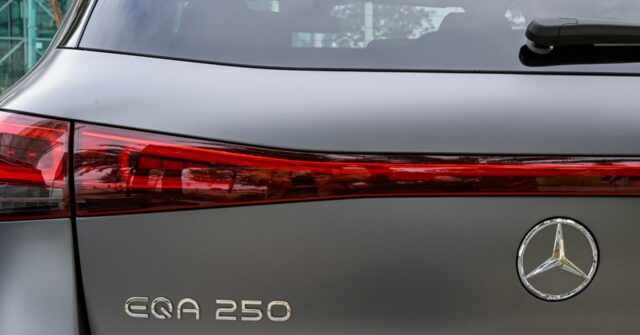In a concerning incident, a family in Northants, UK, experienced a terrifying ordeal when their electric Mercedes EQA spontaneously erupted in flames outside their home. The car caught fire suddenly, resulting in a dramatic and intense blaze that spread rapidly, engulfing not only the vehicle but also threatening the nearby garage and causing smoke damage to their front bedroom. This alarming event unfolded late one evening, and the family’s safety was put at risk as the flames approached their home’s exterior. The couple’s son, James, raised the alarm and quickly called firefighters, who arrived just in time to prevent what could have been a more devastating outcome.
Scott and Georgina Bayliss, the car owners, were left puzzled and distressed by the incident. They noted that their vehicle had been parked for several hours before the explosion, and they had not observed any warning signs or faults in the two-year-old car prior to the fire. The speed at which the flames spread was shocking to both Scott and Georgina, who expressed their fears regarding the safety of this luxury electric vehicle—particularly given its high-end status with a reputable brand like Mercedes-Benz. Scott described the situation as a “pretty calamitous car failure,” highlighting his concern that such incidents could lead to serious injuries or even fatalities in the future.
The rapid-response action of the firefighters was crucial; upon arriving at the scene, they informed the Bayliss family that they were mere moments away from losing their home completely. The couple’s initial shock has now turned into a quest for answers regarding the cause of the fire. As they grapple with the emotional aftermath and the uncertainty surrounding the safety of electric vehicles, their primary concern remains clear: if this could happen to them, it could also happen to others. This incident has raised significant questions about the reliability and safety of electric cars, particularly those marketed as high-end options.
Following the fire, Mercedes-Benz UK initiated an investigation into the incident to determine what went wrong with the vehicle. The family is eager for answers, hoping that the company can provide clarity and understanding of the events that transpired on that fateful evening. This situation serves as a catalyst for broader discussions about the safety of electric vehicles and the potential risks they may pose to drivers and their properties. Given the increasing prevalence of electric cars on the market, such incidents must be thoroughly examined to prevent similar occurrences in the future.
The Bayliss family’s experience, while terrifying, is part of a growing narrative regarding electric vehicles. As technology evolves and more consumers choose electric cars for their environmental benefits, it is vital that manufacturers ensure the utmost safety standards are met. The Bayliss case underscores the importance of consumer awareness and the need for comprehensive regulations that govern the operation and maintenance of these vehicles. Furthermore, it highlights the necessity for manufacturers to be transparent about any known issues and to act decisively when such serious incidents occur.
Ultimately, this incident serves as a poignant reminder of the potential dangers associated with electric vehicles, particularly luxury models that are often perceived as safer alternatives to traditional gasoline cars. As this family seeks answers and justice, their story sheds light on a vital issue facing modern automobile technology and consumer trust. It emphasizes the importance of rigorous testing and accountability from car manufacturers to ensure that their products are not only innovative but also safe for everyday use. The Bayliss family’s ordeal, though distressing, may propel discussions and actions toward greater safety protocols and standards in the electric vehicle industry.

